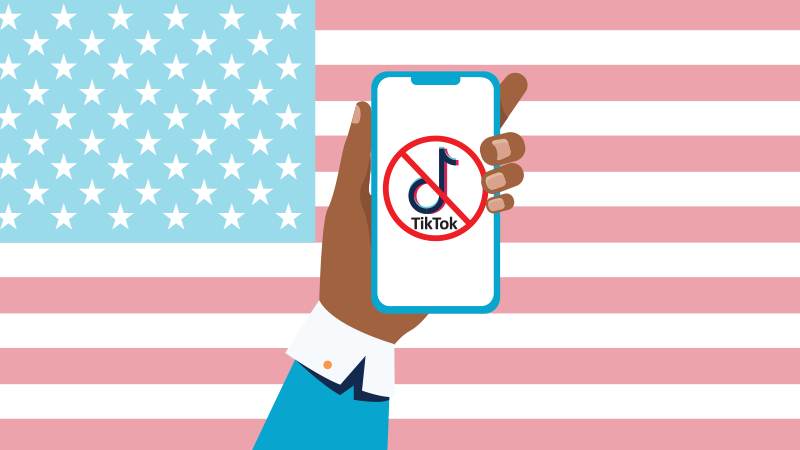
The Latest On TikTok Being Banned
On April 20th, the House passed legislation that could potentially ban TikTok in the US, adding further fuel to the banning discussion following a similar bill passed in March. This development raises concerns for all businesses that have leveraged TikTok for branding, engagement, and lead generation.
Certainly, personal injury law firms are included in this discussion. Within this industry, there appears to be untapped potential to establish a digital presence that could yield remarkable benefits.
While the outcome remains uncertain, it’s imperative for personal injury law firms to assess the potential impact on their marketing strategies and explore alternative avenues to maintain visibility and engagement.
Everyone seems to be buzzing about the “why” behind the potential ban of TikTok, primarily focusing on the perceived security threats it poses to our nation. However, there’s been notably less dialogue about the “what if” or “what next” scenarios. Essentially, if TikTok remains accessible, fantastic—we can continue leveraging it as a digital avenue for growth. But if it does indeed face a ban, the “why” behind it won’t hold as much weight as the other pressing questions. Instead, it’s the “what now” that becomes paramount in charting a path toward sustained growth and success.
TikTok has become a game-changer for personal injury law firms, offering a unique avenue to connect with their target audience in ways that traditional marketing methods can’t match. With its algorithm designed to spotlight personalized content, TikTok empowers firms to amplify their brand visibility and engagement like never before. For personal injury law practices, TikTok isn’t just another social media platform—it’s an opportunity to inject personality into their brand, build trust with their audience, and stand out in a crowded market.
This platform allows attorneys to showcase their expertise in a more relatable and engaging manner, fostering a deeper connection with potential clients. Whether it’s sharing legal insights, addressing common questions, or providing behind-the-scenes glimpses into the firm’s culture, TikTok offers a creative outlet for storytelling that resonates with viewers. By humanizing their brand and showcasing the personalities behind the firm, personal injury attorneys can establish a sense of trust and credibility with their audience, ultimately driving leads and conversions.
In essence, TikTok isn’t just about entertainment—it’s a powerful tool for personal injury law firms to connect with their audience on a personal level, showcase their expertise, and ultimately drive business growth.
The looming possibility of a TikTok ban necessitates strategic planning for personal injury law firms heavily reliant on the platform for marketing purposes. If TikTok is one of the main sources of impressions, clicks, traffic, etc., losing that platform can hurt. However, we need to keep in mind that where there is loss, there is gain. Users are always going to want to digest content like they do on TikTok. So until the next big platform comes out, these TikTok users will be absorbing more content from other channels like Facebook, Instagram, and YouTube.
Diversifying social media presence and strengthening efforts on alternative platforms are essential steps to mitigate the impact of a potential ban. Platforms like Facebook, Instagram, and Snapchat offer viable alternatives, each with its unique features and audience demographics. Law firms can leverage these platforms to continue engaging with their audience through compelling content tailored to resonate with each platform’s user base. This means more opportunities on these channels for your firm. It also means you should be preparing to stand out from the competition.
YouTube, with its emphasis on video content and the introduction of YouTube Shorts, presents another avenue for law firms to explore. By creating informative and visually appealing videos, firms can position themselves as authoritative voices in the personal injury space and attract potential clients seeking legal assistance. Adapting to changes in the social media landscape demonstrates flexibility and foresight, essential qualities for law firms striving to maintain their competitive edge.
I can’t emphasize enough the importance of adaptability in uncertain times. TikTok isn’t the only platform for personal injury law firms to showcase their expertise. Whether TikTok remains accessible or gets banned, firms must be prepared to pivot and capitalize on alternative platforms to effectively reach their target audience.
The potential TikTok ban presents both challenges and opportunities for personal injury law firms, underscoring the need for a diversified digital marketing strategy that can withstand disruptions in the social media landscape. By embracing alternative platforms and continuing to prioritize engaging content, law firms can maintain their visibility and relevance in a post-TikTok era, ensuring they remain competitive and accessible to their target audience across various digital channels. We are going to see more unique content come across Facebook, Instagram, and even LinkedIn. In fact, we already have. Think about ten years ago, going on to your LinkedIn and seeing a video filmed on a phone with creative captions. Now, that has become the norm and a widely popular creative. This evolution of content consumption habits highlights the importance of staying agile and innovative in adapting to changing trends and platforms.
As business owners, we can only work with what we have. This means if TikTok does get banned, we can either complain about what once was, or adapt. It also won’t come as a surprise if it indeed does get banned given the latest legislation. So being proactive rather than reactive will help your law firm stay ahead of the curve. Anticipating potential changes in the social media landscape is crucial for personal injury law firms to remain resilient in the face of uncertainty. While the possibility of a TikTok ban may seem daunting, it’s essential to recognize that the digital marketing landscape is constantly evolving. By staying proactive and adaptable, law firms can position themselves to capitalize on emerging opportunities and navigate challenges effectively. This forward-thinking approach not only ensures continuity in marketing efforts but also reinforces the firm’s agility and ability to thrive in an ever-changing digital environment.



